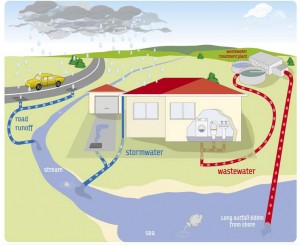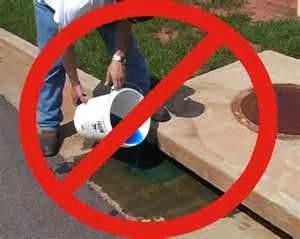Stormwater Master Plan
The City of Round Rock is working on an update to its Stormwater Master Plan and is asking for public feedback on drainage and flooding across the community.
The plan aims to update the Stormwater Master Plan previously completed in 2014, which provided a cohesive guide to help the City plan for long-term management of its stormwater system. The plan identifies issues such as maintenance of existing infrastructure, solving historically established flooding problems and strategic regional projects to promote economic development in targeted growth areas. As conditions have changed over time, the update aims to reassess creeks within the City limits with updated data to evaluate potential flood and erosion risks, along with creating a list of areas in need of minor maintenance.
Round Rock is seeking input from all residents to help guide recommendations for the plan. To participate and learn more, visit publicinput.com/rrstormwater.
What is Stormwater?
 Stormwater is, in essence, just what it sounds like, water from a storm. When it rains, water flows over driveways, parking lots, and streets, picking up pollutants as it flows into storm drains – you know those openings along the curb you’re terrified of falling into or the caged hole in the middle of the parking lot you just know you’ll drop your keys into.
Stormwater is, in essence, just what it sounds like, water from a storm. When it rains, water flows over driveways, parking lots, and streets, picking up pollutants as it flows into storm drains – you know those openings along the curb you’re terrified of falling into or the caged hole in the middle of the parking lot you just know you’ll drop your keys into.
Contrary to popular belief, when stormwater or anything else goes in the storm drain, it flows directly into the nearest creek, lake, or other body of water. No filter. No treatment. Just straight into the water you swim in, boat on, fish from, and well, you get the drift.
Storm Sewer System vs. Sanitary Sewer System
The water that goes down the sanitary sewer system (from sinks or toilets) flows to a wastewater treatment plant where it is treated and filtered prior to entering any water bodies.
The stormwater and urban runoff water that flows down driveways and streets and into the storm sewer system flows directly to our creeks, lakes, and rivers. Anything that enters a storm sewer system is discharged untreated into the water we use for swimming, fishing, and providing drinking water.
If It Isn’t Rain, It Doesn’t Go in the Drain.
Illicit Discharge
 An illicit discharge (illegal dumping) is any discharge into a storm drain that is not composed entirely of stormwater. Examples include dumping of automotive fluids, household hazardous waste, grass clippings, leaves, industrial waste, restaurant waste, etc. into the storm drains. With a few exceptions, anything other than the water that falls from the sky is an illicit discharge, and it is illegal. The only exceptions are discharges from dechlorinated swimming pools, residential car washing, and fire protection water.
An illicit discharge (illegal dumping) is any discharge into a storm drain that is not composed entirely of stormwater. Examples include dumping of automotive fluids, household hazardous waste, grass clippings, leaves, industrial waste, restaurant waste, etc. into the storm drains. With a few exceptions, anything other than the water that falls from the sky is an illicit discharge, and it is illegal. The only exceptions are discharges from dechlorinated swimming pools, residential car washing, and fire protection water.
Report an Illicit Discharge
To report a suspected illicit discharge, please contact stormwater staff or call 512-218-7046. Failure to remedy an illicit discharge notice can result in remediation costs and fines of $500 to $2000 per day.
Common sources of illicit discharges
- Sanitary Wastewater
- Household Cleaners
- Pesticides
- Chlorinated Pool Water
- Motor Oil
- Paints
- Weed Killers
- Laundry Wastewater
How Can You Help?
Stormwater picks up anything in it’s path as it travels across yards, driveways, and streets and down into the storm drain. Do your part, put waste in it’s place and save the drain for the rain.
- Never sweep or blow leaves into a storm drain. Leaves and yard debris can be recycled into mulch at the Brush Recycling Center.
- Dispose of used motor oil at the City’s Recycling Center.
- Follow directions on pesticides and fertilizers and avoid use when rain is forecasted.
- Take leftover paint, cleaners, and other household chemicals to an HHW Collection.
- Pick up pet waste and dispose of it properly to keep bacteria and parasites out of our creeks.
- If you see someone putting anything in the storm drain, report it. It is illegal. Call 512-218-7046 or email stormwater@roundrocktexas.gov to report illegal dumping. All reports are anonymous.
The City of Round Rock adopted an Illicit Discharge Ordinance on March 11, 2010, to protect local water quality and to comply with the City’s MS4 permit issued by TCEQ and the EPA’s Clean Water Act.


